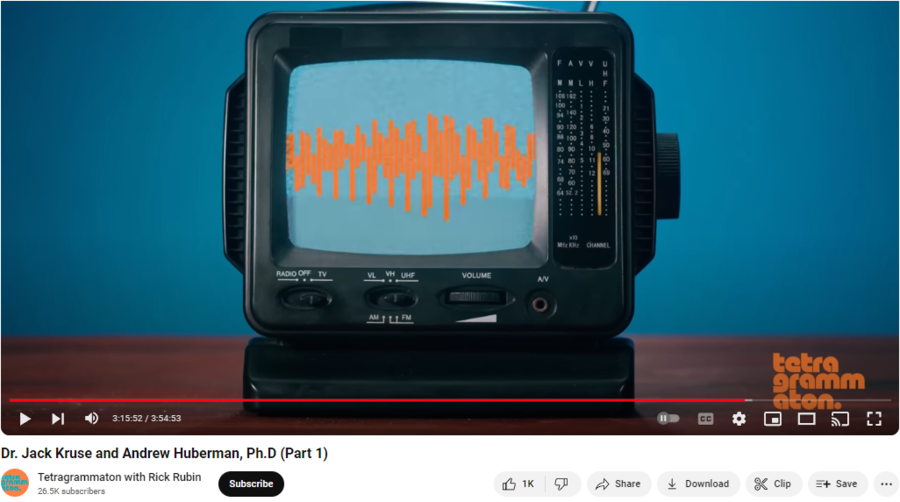
Do transplanted organs transmit character traits from the donor to the person receiving them, as a video on social media claims? No, that's not true: Transplant surgeons and a nonprofit for transplant patients told Lead Stories that no scientific evidence or credible research supports the idea that transplanted organs can transmit character traits from the donor to the recipient. Organ transplantation primarily involves the transfer of physiological functions, and any claims about personality traits being transferred lack scientific basis or validation.
The claim appeared in a video (archived here) on YouTube by Tetragrammaton with Rick Rubin on April 28, 2023, under the title "Dr. Jack Kruse and Andrew Huberman, Ph.D (Part 1)." The video's caption begins with:
Dr. Jack Kruse is a neurosurgeon who had an awakening in 2007 when he suffered a torn meniscus in his knee at 6'2", 357 lbs. This led to his further study of physics, light, magnetism, and electricity. He ultimately concluded that modern medicine lacked a deep understanding of how humans function in relation to the natural world.
This is what the post looked like on Instagram at the time of writing:
(Source: Instagram screenshot taken on Thu Feb 8 17:28:43 2024 UTC)
The video
During a short segment in the nearly four-hour podcast, neurosurgeon and self-described "optimal health educator" Dr. Jack Kruse mentioned that there have been three instances in his medical career when transplant recipients appeared to pick up character traits from an organ donor. He explained one in detail, starting at about 3:16:23 into the show. A condensed transcript of what he said is available below:
I got a young kid -- 18, 19 years old -- his family to donate his organs. And the way it used to work, we would get a letter letting us know where all the organs went to the different people. No data, you know, this HIPAA stuff, but you knew that this person got eyes, this person got a liver and this person got the heart. And they don't give you names ...
So six months later, I get a lady show up to my clinic who doesn't have a neurosurgery problem. She just wants to come talk to me, and the office girl's like, 'We don't know what this is about.'
She comes in and she says: 'Look,' she goes, 'I don't know who to ask. I've asked my primary care doctor, I've asked everybody else.' She goes, 'Ever since I got this heart. I have this intense desire for McDonald's french fries.' ...
And I just sat there stunned. And I didn't know what to say to her. She had no way of knowing this. The data is not out. You can't get this information ... The kid died at a McDonald's drive-thru when a car plowed into him in a T-bone, and they found McDonald's french fries in the seat next to him. He was eating the french fries when the accident occurred. This is a lady who never ate potatoes.
Transplantation experts
In a February 9, 2024, email to Lead Stories, Dr. Joseph Magliocca, director of the Vanderbilt Transplant Center, said, "There are anecdotal reports of people acquiring personality traits of their donor after organ transplantation." He continued:
The phenomenon appears to be seen more frequently with heart transplantation. However, I am not aware of any scientific evidence to support that hypothesis. Since each person's experience is unique to them, it certainly cannot be dismissed entirely but there is no compelling data to suggest that it does indeed happen. We would welcome further study in this area of research.
Dr. Aleem Siddique, a heart and lung transplant surgeon at the University of Nebraska Medical Center, told Lead Stories in a February 8, 2024, email that transplants don't work that way. He said:
Organs cannot transmit character traits from donor to recipient.
In a February 8, 2024, email to Lead Stories, Anne Paschke, a spokesperson for the nonprofit United Network for Organ Sharing, said the donor-to-recipient claim isn't supported by anything she's seen:
I'm not aware of any research into the phenomenon. As far as I know, there are only anecdotal accounts.
Lead Stories looked at three papers (here, here and here) that considered the purported connection between organ transplants and personality changes. While the articles showed some correlation between having an organ transplant and a shift in character traits, none of them provided proof of direct causation between the two.
Dr. Mitchell B. Liester, an assistant clinical professor of psychiatry at the University of Colorado School of Medicine, authored or co-authored two of those papers. He discussed his findings in a series of emails on February 8, 2024, with Lead Stories.
While Liester believes there is "evidence of personality changes following organ transplants," and has had a patient tell him about such an experience following a transplant, Liester also acknowledged that "more studies are needed." He added:
The causal mechanism remains to be determined.
Lead Stories asked if something else might have triggered the observed personality changes, such as the trauma of facing death or potential death, rather than the transplanted organ itself introducing something from the donor to the recipient. Liester replied:
Good question. We need studies to clarify which factors cause the personality changes.
Additional Lead Stories fact checks of claims about medicine can be found here.


















